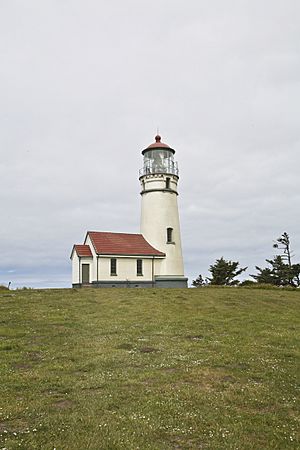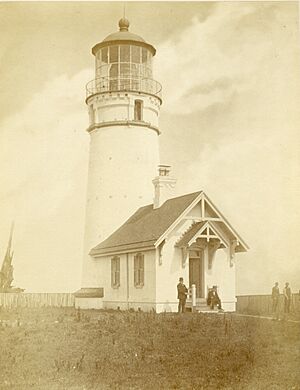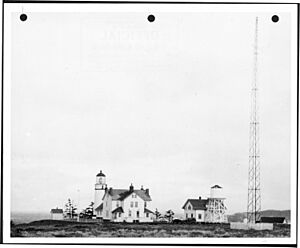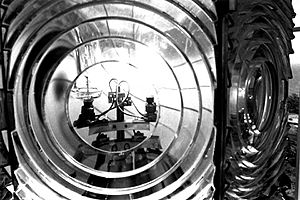Cape Blanco Light facts for kids
 |
|
| Cape Blanco Light | |
|
|
|
| Location | Oregon |
|---|---|
| Coordinates | 42°50′12″N 124°33′48″W / 42.83667°N 124.56333°W |
| Year first constructed | 1870 |
| Year first lit | December 20, 1870 |
| Automated | 1980 |
| Foundation | Brick |
| Construction | Brick |
| Tower shape | Conical attached to workroom |
| Markings / pattern | White tower, green lantern, red dome |
| Height | 59 feet (18 m) |
| Focal height | 256 feet (78 m) |
| Original lens | First order Fresnel (moved to Tongue Point in Astoria) |
| Current lens | Second order Fresnel (1936) |
| Range | 23 nautical miles (43 km; 26 mi) |
| Characteristic | Flash White 20 Seconds |
The Cape Blanco Light is a historic lighthouse located on Cape Blanco in Oregon, United States. It stands tall within Cape Blanco State Park, guiding ships along the coast.
Contents
Building the Lighthouse
Imagine a time when ships sailed close to shore, facing hidden dangers. The waters near Cape Blanco had many dangerous reefs and islands. Because of this, the government decided a lighthouse was needed to keep sailors safe.
In 1867, land was bought for the lighthouse. Over the next three years, the Cape Blanco Light was built. Lt. Col. Robert Stockton Williamson led the project. Building materials were brought in, but the bricks were made right there on the cape! This saved money and made the construction easier.
Life of the Lighthouse Keepers
After the lighthouse was finished, brave people called keepers lived there. Their job was to make sure the light was always shining. They had to keep the lamps clean and working, no matter the weather.
Long-Serving Keepers
Two of the most famous keepers were James Langlois and James Hughes. Langlois worked at the lighthouse for an amazing 42 years! Hughes served for 38 years. Both men raised their families at or near the lighthouse.
Life at the lighthouse was often crowded. Keeper Langlois asked for more housing for years because his large family needed more space. Finally, in 1909, new living quarters were built for the head keeper.
James Hughes found his own solution. He owned land nearby and built a home for his family. He then commuted to the lighthouse for his shifts.
Challenges of the Cape
The cape is a tough place to live. It has very strong winds in spring and summer. In winter, severe storms hit the coast. This meant the keepers were always busy. They had to make constant repairs and paint the lighthouse often.
Despite these challenges, both Langlois and Hughes stayed at Cape Blanco Light until they retired. Their dedication helped countless ships navigate safely past the dangerous Oregon coast.





